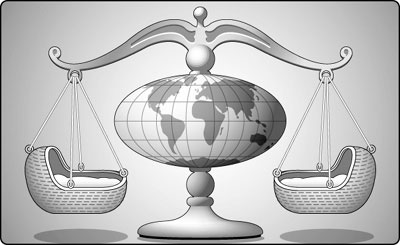Continuing issues and debate concerning transnational commercial surrogacy during the COVID-19 pandemic and beyond
By Yuri Hibino, Sonia Allan, and Damian Adams,
BioNews
| 11. 30. 2020
The regulation of surrogacy varies around the world. Most countries that have laws, prohibit all forms of surrogacy, while several permit altruistic arrangements. A small number permit commercial surrogacy arrangements, and accept commissioning couples, or singles from nations where prohibitions exist. As a result, issues abound. For example, despite growing recognition that children have a right to information about their birth mother, gamete donor(s), and genetic siblings, transnational arrangements may provide little to no opportunity to build relationships when separated by language, culture, and/or location. Issues regarding the sale and commodification of children persist; cases of child abandonment are known. Trafficking of women across borders, bonded labour, health risks associated with surrogacy and egg donation, and ill-treatment of surrogates and intending mothers reported.
In 2020, COVID-19 also saw up to 1000 babies left in hospitals (or orphanages) in Russia, with intending parents unable to travel. In the Ukraine, babies were cared for in hotel rooms by nurses or nannies, or placed into public care (see BioNews 1048). Some surrogates struggled as they bonded with the baby or worried...
Related Articles
By Katrina Northrop, The Washington Post | 04.06.2025
photo via Wikimedia Commons licensed under CC by 3.0
China's most infamous scientist is attempting a comeback. He Jiankui, who went to jail for three years after claiming he had created the world's first genetically altered babies, says he remains...
By Anumita Kaur [cites CGS’ Katie Hasson], The Washington Post | 03.25.2025
Genetic information company 23andMe has said that it is headed to bankruptcy court, raising questions for what happens to the DNA shared by millions of people with the company via saliva test kits.
Sunday’s announcement clears the way for a new...
By Peter Wehling, Tino Plümecke, and Isabelle Bartram
| 03.26.2025
This article was originally published as “Soziogenomik und polygene Scores” in issue 272 (February 2025) of the German-language journal Gen-ethischer Informationsdienst (GID); translated by the authors.
In mid-November 2024, the British organization Hope not Hate published its investigative research ‘Inside the Eugenics Revival’. In addition to documentating an active international “race research” network, the investigation also brought to light the existence of a US start-up that offers eugenic embryo selection. Heliospect Genomics aims to enable wealthy couples to...
By Frank Landymore, Futurism | 03.18.2025
You can only throw so much money at a problem.
This, more or less, is the line being taken by AI researchers in a recent survey. Asked whether "scaling up" current AI approaches could lead to achieving artificial general...




